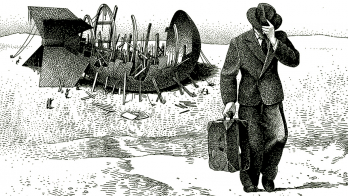At its 147th meeting on 20 June, CERN Council heard news on progress towards start-up of the LHC later this summer. In addition, the latest in a series of audits covering all aspects of safety and environmental was presented to Council at the meeting. It addressed the question of whether there is any danger related to the production of new particles at the LHC.
Commissioning of the 27 km LHC started in 2007 with the first cool down of one of the machine’s eight sectors. Once successfully cooled, each sector has to pass through hardware commissioning, which involves intensive electrical tests, before being handed over to the operations team. By the time of the Council meeting, five of the eight sectors were at or close to the operating temperature of 1.9 K and the remaining three were at various stages of being cooled down. Moreover, sector 5-6 had passed through all steps of the hardware commissioning and was in the hands of the operations team.
When the LHC starts up this summer, its proton beams will collide at higher energies than have ever been produced in a particle accelerator, although nature routinely produces higher energies in cosmic-ray collisions. Nevertheless, concerns about the safety of whatever might be created in such high-energy particle collisions have been addressed for many years.
The latest review of the safety of the LHC’s collisions was prepared by the LHC Safety Assessment Group (LSAG), which comprises scientists at CERN, the University of California, Santa Barbara, and the Institute for Nuclear Research of the Russian Academy of Sciences. The LSAG report updates a 2003 paper by the LHC Safety Study Group and incorporates recent experimental and observational data. It confirms and strengthens the conclusion of the 2003 report that there is no cause for concern. Whatever the LHC will do, nature has already done many times over during the lifetime of the Earth and other astronomical bodies.
The new report has been reviewed by the Scientific Policy Committee (SPC), which advises Council on scientific matters. A panel of five independent scientists, including one Nobel Laureate, reviewed and endorsed the authors’ approach of basing their arguments on irrefutable observational evidence to conclude that new particles produced at the LHC will pose no danger. The panel presented its conclusions to a meeting of the full 20 members of the SPC, who unanimously approved this conclusion, prior to the Council meeting.
• The LSAG report is accompanied by a summary in non-technical language. It is available together with other documents relating to the safety and environmental impact of the LHC at http://public.web.cern.ch/public/en/LHC/Safety-en.html.







